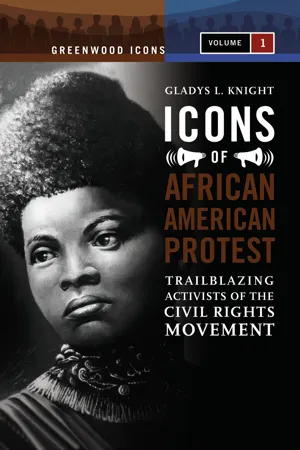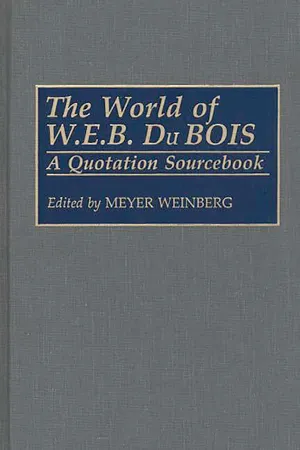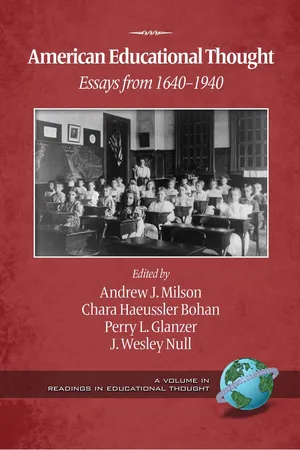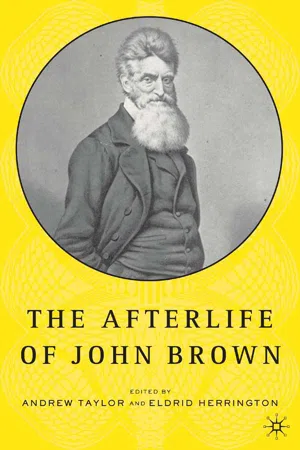History
WEB Dubois Books
W.E.B. Du Bois was a prominent African American sociologist, historian, and civil rights activist. He is best known for his book "The Souls of Black Folk," which explores the experience of African Americans in the United States. Du Bois also wrote extensively on racial inequality, advocating for social and political change to address systemic racism. His works continue to be influential in the study of African American history and sociology.
Written by Perlego with AI-assistance
Related key terms
1 of 5
5 Key excerpts on "WEB Dubois Books"
- eBook - PDF
Icons of African American Protest
Trailblazing Activists of the Civil Rights Movement [2 volumes]
- Gladys L. Knight(Author)
- 2008(Publication Date)
- Greenwood(Publisher)
W.E.B. Du Bois (1868–1963) Library of Congress W.E.B. Du Bois was a prominent scholar, intellectual, writer, and editor. Born and raised in a predominantly white community in the North and edu- cated at Fisk (a leading historically black university in the South), Harvard (a predominately white Ivy League university), and the prestigious Univer- sity of Berlin in Germany, Du Bois was a prodigy among African Americans in the early twentieth century. He utilized his talents and influence to com- bat racism, segregation, and anti-black violence and promote the advance- ment of African Americans. Du Bois helped organize and participated in organizations such as the African American Council and the Niagara Move- ment. The National Association for the Advancement of Colored People (NAACP) was his greatest undertaking, and as editor of its organ, The Cri- sis, Du Bois became the foremost agitator, influential thinker, and commen- tator of his time. Through the written word—sociological studies, essays, articles, and books—Du Bois expressed himself freely, breaking down the Negro Problem and its various solutions, and displaying unprecedented knowledge of the social conditions, history, and culture of African Americans. He also lashed out with sharp criticism. His prolific and seminal writing reflected a com- plex man who espoused a broad array of methodologies. Among these were his advancement of the Talented Tenth, black self-defense, black capitalism, integrationism, Pan-Africanism, socialism, and communism. Above all else, he was unapologetically controversial. With the worsening of conditions for African Americans, Du Bois became progressively more radical and disillusioned, to the point that he moved to Ghana in 1961. Two years later, he renounced his American citizenship. On August 27, 1963, he died at the age of ninety-five. - eBook - PDF
The World of W.E.B. Du Bois
A Quotation Sourcebook
- Meyer Weinberg(Author)
- 1992(Publication Date)
- Greenwood(Publisher)
Page 1 Introduction W.E.B.Du Bois stands preeminent among intellectuals of the United States in this century. None wrote more of enduring importance or continues to be as relevant for our own day. Equally significant, Du Bois was an activist intellectual—he organized, protested, laid out programs, petitioned, and raised questions of longterm strategy and shortterm tactics. He mastered numerous forms of written expression: detailed scholarly investigations superior to many accepted models of research; vast investigative designs, stretching in one case over a century; editing of periodicals dealing more popularly with problems of the contemporary world; articles in learned and topical media; and sustained illumination in a new light of persistent issues ranging from the Reconstruction period of United States history to the relatively brief career of racism in world history. He was also a commanding speaker. To study his life and writings is simultaneously to study African American history. His published works and his correspondence are about and of that history. But these are also part of the general history of the United States. Du Bois wrote a great deal with white Americans in mind. He did not strive only to free blacks from oppression; he also worked to warn all Americans that democracy for them was equally endangered by racism. The major subjects of his writings range widely. Black people in the United States and the world were the foundation upon which the rest was built. He once wrote an essay contending that black colleges should start their curricula with special attention to black life and history. Then, the span of study should be broadened to include all of world civilization. This was, in fact, how Du Bois’s own thought progressed. To study blacks alone was not to do justice to the broad humanity of all blacks and of others. Black history from Africa forward appears throughout his writings. - eBook - PDF
- Andrew J. Milson, Chara Haeussler Bohan, Perry L. Glanzer(Authors)
- 2015(Publication Date)
- Information Age Publishing(Publisher)
American Educational Thought: Essays from 1640–1940, pages 425–447 Copyright © 2010 by Information Age Publishing All rights of reproduction in any form reserved. 425 26 Selected Writings of W.E.B. DuBois William Edward Burghardt DuBois (1868– 1963) began thinking and writing about the so- cial status of African Americans at an early age. He wrote articles for the New York Globe at age 15 and completed a doctorate at Harvard when he was 26. He was convinced that Blacks must push and agitate for social advancement to occur. He was opposed to the methods of “submission” and “adjustment” pursued by Booker T. Washington. DuBois wrote prolifi- cally and served as the editor-in-chief of Cri- sis magazine, published by the NAACP, for 25 years. His scathing editorials often provoked conflict with the NAACP leadership. DuBois grew increasingly frustrated by the persistence of racial injustice in the United States and the failure of Black leaders to be aggressive in their demands for change. He embraced radical social causes and ideologies, such as Pan-Africanism and communism, which alienated him from the mainstream. He lived in Ghana during the last years of his life and became a Ghanaian citizen shortly before his death in 1963. In the following selections, DuBois explains his views on the role of education in the social advancement of African Americans and his disagreements with the philosophy and methods of Booker T. Washington. —AJM 426 American Educational Thought: Essays from 1640–1940 Of the Training of Black Men, 1902 From the shimmering swirl of waters where many, many thoughts ago the slave-ship first saw the square tower of Jamestown have flowed down to our day three streams of thinking: one from the larger world here and over- seas, saying, the multiplying of human wants in culture lands calls for the world-wide co-operation of men in satisfying them. Hence arises a new hu- man unity, pulling the ends of earth nearer, and all men, black, yellow, and white. - eBook - PDF
The Problem of the Color Line at the Turn of the Twentieth Century
The Essential Early Essays
- W. E. B. Du Bois, Nahum Dimitri Chandler(Authors)
- 2014(Publication Date)
- Fordham University Press(Publisher)
In essence, it named matters African American within the field of the social in such a way as to expose both the modes in which they expressed systemic social processes and the way in which they yet also announced an originary formation of existence beyond any simple reduction to the already given forms of the social. Du Bois’s pro- jection as it can be recalled on the basis of the collection of work in the present volume, situated reciprocally with his major book length work and collaborative work of the same moment, may help us to traverse in a more supple manner the still too rigidly disciplined contemporary modes of the human sciences, especially as they are now being redeployed in engaging the general field of an African American studies. In this sense, this collection proposes that another register of address be affirmed in our moment, other than what has so far been projected: that a certain paleonymic practice, of the critical recollection and desedimentation of past itineraries, in this case that of Du Bois at the turn of the previous century, be retained as a form of our responsibility to a possible future thought—of the “Negro” American, certainly, but more generally, of that which would remain beyond such horizon, toward a future that will always have not yet been. Notes 1. Altogether, while generally reliable and highly useful, these collections remain incomplete or partial, and the Aptheker collection is no longer in print, so that even items thereof are often difficult to access (Du Bois 1982a, 1982b, 1982c, 1982d; Du Bois 1982h; Du Bois 1986d). 2. I refer here to the texts by W. E. B. Du Bois published in thirty-seven volumes under the general title of The Complete Published Writings of W. E. B. Du Bois, edited and introduced by Herbert Aptheker (1973–86). - eBook - PDF
- E. Herrington(Author)
- 2005(Publication Date)
- Palgrave Macmillan(Publisher)
9 W.E.B. Du Bois’s John Brown: Placing Racial Justice at the Center of a Socialist Politics Julie Husband W hen a rival John Brown biographer asked for advice on sources, the young African American scholar William E.B. Du Bois wrote that his would not be a standard biography. Instead of an exhaustive inves- tigation of new material, he would create “an interpretation” (Du Bois 1973, 9). Du Bois’s interpretation, written during the crucial five-year period coinciding with his Niagara Movement experiment, interrogates the nature of slavery—and all forms of labor—under laissez-faire capital- ism. Du Bois made Brown a prescient critic of the monopoly distortions of the free market that were to shape post–Civil War race and class relations. Through writing his biography of John Brown, Du Bois clarified his own mission and strategy as an emerging race leader. During this period of his political consolidation, between 1904 and 1909, Du Bois could identify with Brown as the shepherd who tried to organize wool farmers against manufacturers, the activist whose slim resources prohibited an effective mass movement, and the husband and father whose family suffered neglect and privation for his commitment to African American freedom and civil rights. In fact, Du Bois’s identification with Brown permitted a reading of Brown’s political and professional life no other biographer has dared. For Du Bois, John Brown is significant because he recognized that “the price of repression is greater than the cost of liberty” and because he extended this credo beyond slaves to all workers at the mercy of an entrenched, oligarchic capitalist class. Like many Brown biographers, Du Bois makes Brown a prophet of the Civil War; but unlike others, Du Bois also makes Brown a prophet of the new forms of economic exploitation African Americans faced following the Civil War—sharecropping and discrimination within the labor movement.
Index pages curate the most relevant extracts from our library of academic textbooks. They’ve been created using an in-house natural language model (NLM), each adding context and meaning to key research topics.




